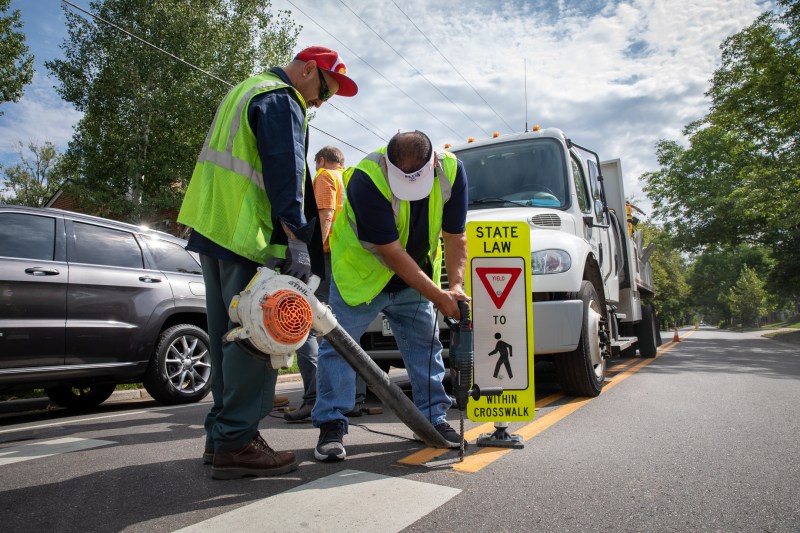Transportation Election Guide: Propositions CC & 2A

In Tuesday’s election, Denver voters will consider two ballot measures that will affect city and state transportation issues.
The Denver Elections Division mailed ballots earlier this month, and voters must return them by November 5 at 7 p.m. Ballots can be mailed or dropped off at any of 47 polling centers and election boxes.
Statewide
Proposition CC: End TABOR refunds
Proposition CC would allow the state to keep TABOR refunds.
In 1992, voters changed the Colorado constitution to severely limit taxes. The Taxpayer’s Bill of Rights, also known as TABOR, is an unusual amendment requiring voters to approve all tax increases. The state also must issue tax refunds when its revenue growth exceeds a rate determined by a formula. The formula changes every year based on the rate of inflation and population growth.
Voters have not received a TABOR refund since 2015. Then it ranged between $13 and $41, according to the Denver Post. Over the next three years, refunds could range between $20 and $248.
As a constitutional amendment, TABOR blocks elected officials from raising taxes, even as education and transportation needs evolve. The decision is then left to voters, who can be fickle, even when there is widespread consensus about the need to address critical issues.
Last year, for example, voters rejected two ballot measures, Propositions 109 and 110, that would have funded highways, county roads and other modes of transportation.
Under CC, the state will keep TABOR refunds, which would total between $186 million and $383 million per year over the next three years, according to state projections reported in the Post. The funds would be split evenly among three priorities:
- Public schools
- Higher education
- Roads, bridges and transit projects
The measure does not create new taxes, leading supporters to argue that it is not a tax increase. Opponents point out that ending TABOR refunds amounts to a tax increase.
Endorsements
- Yes: Commuting Solutions
- No: Denver Post Editorial Board
- Yes: Downtown Denver Partnership
- Yes: American Society of Civil Engineers
- No: Independence Institute
- Yes: Governor Polis
- No: Americans for Prosperity of Colorado
- Yes: List of endorsements
- No: Colorado Libertarian and Republican Parties
- Yes: Colorado Democratic Party
For more information, see: Balotpedia, Denver Post, Colorado Sun, Colorado Public Radio
Denver
2A: Create a Department of Transportation
Mayor Hancock proposed changing the Department of Public Works into the Department of Transportation and Infrastructure earlier this year. The move would state that transportation to the agency’s top priority and could elevate DPW to a cabinet-level department while.
Several U.S. cities have made similar moves in the last decade.
Streetsblog called for such a change in 2016, arguing that the city was moving too slowly toward its goal of reducing the number of people driving alone. “Without rapid changes to make walking, biking, and transit more appealing, the city is going to get overrun by car traffic,” wrote editor Dave Sachs.
The shift could also save money. When the officials announced the proposal in April, Streetsblog reported:
The new department would shift its primary focus to transportation, while allowing it to coordinate its non-transportation projects under a new “one build” approach. For example, instead of digging up a street two times, once to repave it, and later to replace the neighborhood’s sewers, this new planning process would anticipate the repaving project and plan for it to follow the sewer replacement.
The charter change would also allow the city to offer transportation services. According to our earlier reporting, Denver has no plans to do so, but “the city could one day pay the Regional Transportation District to provide additional transit service within Denver, or create its own transit agency to run alongside RTD.”
The city charter requires voters to approve the change.
Endorsements:
- Yes on 2A: Denver Regional Mobility & Access Council, Bicycle Colorado, Denver Streets Partnership, Colorado Cross-Disability Coalition
- Yes: Denver Post
- No: No arguments against filed with the city elections department
For more information: Streetsblog Denver, Denver Post, Denverite
Correction: This story has been updated to reflect that passing Proposition 2A may one day elevate the Department of Transportation and Infrastructure to a cabinet-level positions within the mayor’s administration. A previous version stated that the proposition alone would do so.


